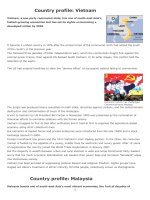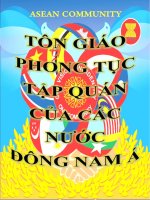11 nước Đông Nam Á
Bạn đang xem bản rút gọn của tài liệu. Xem và tải ngay bản đầy đủ của tài liệu tại đây (379.42 KB, 13 trang )
Country profile: Vietnam
Vietnam, a one-party communist state, has one of south-east Asia's
fastest-growing economies and has set its sights on becoming a
developed nation by 2020.
It became a unified country in 1976 after the armed forces of the communist north had seized the south
of the country in the previous year.
This followed three decades of bitter independence wars, which the communists fought first against the
colonial power France, then against US-backed South Vietnam. In its latter stages, this conflict held the
attention of the world.
The US had entered hostilities to stem the "domino effect" of successive nations falling to communism.
The jungle war produced heavy casualties on both sides, atrocities against civilians, and the indiscriminate
destruction and contamination of much of the landscape.
A visit to Vietnam by US President Bill Clinton in November 2000 was presented as the culmination of
American efforts to normalise relations with the former enemy.
Vietnam struggled to find its feet after unification and it tried at first to organise the agriculture-based
economy along strict collectivist lines.
But elements of market forces and private enterprise were introduced from the late 1980s and a stock
exchange opened in 2000.
Foreign investment has grown and the US is Vietnam's main trading partner. In the cities, the consumer
market is fuelled by the appetite of a young, middle class for electronic and luxury goods. After 12 years
of negotiations the country joined the World Trade Organization in January 2007.
But the disparity in wealth between urban and rural Vietnam is wide and some Communist Party leaders
worry that too much economic liberalisation will weaken their power base and introduce "decadent" ideas
into Vietnamese society.
Vietnam has been accused of suppressing political dissent and religious freedom. Rights groups have
singled out Hanoi's treatment of ethnic minority hill tribe people, collectively known as Montagnards.
Country profile: Malaysia
Malaysia boasts one of south-east Asia's most vibrant economies, the fruit of decades of
Economic reform has challenged
Communist Party ideology
1
industrial growth and political stability.
Its multi-ethnic, multi-religious society encompasses a majority Muslim population in most of its states
and an economically-powerful Chinese community.
Consisting of two regions separated by some 640 miles of the South China Sea, Malaysia is a federation of
13 states and three federal territories.
It is one of the region's key tourist destinations, offering excellent beaches and brilliant scenery. Dense
rainforests in the eastern states of Sarawak and Sabah, on the island of Borneo, are a refuge for wildlife
and tribal traditions.
Ethnic Malays comprise some 60% of the population. Chinese constitute around 26%; Indians and
indigenous peoples make up the rest. The communities coexist in relative harmony, although there is little
racial interaction.
Although since 1971 Malays have benefited from positive discrimination in business, education and the
civil service, ethnic Chinese continue to hold economic power and are the wealthiest community. The
Malays remain the dominant group in politics while the Indians are among the poorest.
Malaysia's economic prospects remain healthy, although it faces fierce competition from its neighbours,
and from China and India.
Free trade talks were opened with the US, but the US has said it will not be able to conclude a deal in
2007 as the two sides failed to meet a deadline to secure a deal before President George W Bush's fast-
track trade authority expired in June.
The country is among the world's biggest producers of computer disk drives, palm oil, rubber and timber.
It has a state-controlled car maker, Proton, and tourism has considerable room for expansion.
But it also faces serious challenges - politically, in the form of sustaining stability in the face of religious
differences and the ethnic wealth gap, and, environmentally, in preserving its valuable forests.
Malaysia's human rights record has come in for international criticism. Internal security laws allow
suspects to be detained without charge or trial.
Country profile: Singapore
2
Malaysia made the transformation
from a farm-based economy
Singapore is south-east Asia's hi-tech, wealthy city-state which is
also known for the conservatism of its leaders and its strict social
controls.
The country comprises the main island - linked by a causeway and a bridge to the southern tip of Malaysia
- and around 50 smaller islands.
Once a colonial outpost of Britain, Singapore has become one of the world's most prosperous places - with
glittering skyscrapers and a thriving port.
Most of its people live in public-housing tower blocks. They enjoy one of the world's highest standards of
living, but also a system of punishments for acts deemed to be anti-social.
Government-led initiatives have encouraged Singaporeans to have more babies and to be more
courteous. Citizens are urged to "Speak Good English" in place of a local slang known as "Singlish".
Chinese make up more than 75% of the community; Malays and Indians make up much of the remainder.
There are many foreign workers.
Although Singapore is a multi-party nation, the People's Action Party (PAP) has been the dominant force
since independence. Rights groups have accused some politicians of using defamation suits to silence their
opponents.
Singapore is often referred to as one of Asia's economic "tigers". Its economy is driven by electronics
manufacturing and financial services and has weathered regional crises, including the 1997 Asian markets
slump and the 2003 Sars virus outbreak.
In the face of strong competition from regional manufacturers, Singapore is seeking to strengthen its
services sector and tourism industry.
The country was referred to - less kindly - by the writer William Gibson as "Disneyland with the death
penalty".
Singapore argues that its use of capital punishment - applied mostly for drugs trafficking offences - has
stopped the growth of narcotics syndicates.
Country profile: Thailand
Thailand is a country of mountains, tropical rainforests and flat plains. Religion, the monarchy
3
Britain's Sir Stamford Raffles saw
Singapore's commercial potential
and the military have helped to shape its society and politics.
The 1980s brought economic boom, and the agriculture-based economy changed as Thais flocked to work
in industry and the services sector.
But the bubble burst in 1997 with the south-east Asian financial crisis. Stock and property prices
plummeted, dragging down the currency and leading to bankruptcies, recession and unemployment.
The government of the time - under Chuan Leekpai - worked with the IMF to reform the battered
economy.
But the 1997 experience caused many Thais to regard international finance with deep distrust. Mr Chuan
lost the 2001 elections to an opponent who promised to help people with their daily difficulties.
Though Thailand's recent governments have been civilian and democratically-elected, the country has
seen turbulent times. The military governed, on and off, between 1947 and 1992 - a period characterised
by coups, coup attempts and popular protests.
In September 2006, the military once again stepped into politics, carrying out a bloodless coup against
Prime Minister Thaksin Shinawatra while he was at the UN General Assembly.
An interim prime minister was appointed a month later.
By the end of 2007, the military junta had drafted a new constitution and held general elections, marking
the beginning of the transition back to civilian rule.
Thailand has a minority Muslim population, concentrated in its southern provinces.
A decades-old separatist struggle in the region - which abated in the 1980s - flared again in 2004. The
violence has claimed more than 3,000 lives.
Thailand's capital, Bangkok expanded rapidly with the influx of workers during the boom years. It is one
of Asia's most vibrant, and heavily-congested, cities.
The large-scale sex industry which flourishes there contributed to the incidence of HIV infection - a major
concern for the Thai government.
4
Cranes vie with the capital's tallest
building, the Baiyoke 2 tower
Thailand has taken the lead in the region in distributing cheaper generic drugs for Aids sufferers and
awareness campaigns are credited with reducing the number of new infections.
Thai cuisine is known throughout the world for its use of hot, sweet and sour spices. Sculptures of the
Buddha in sitting or reclining positions are also characteristic of Thailand, as is classical dance.
Country profile: Indonesia
Spread across a chain of thousands of islands between Asia and
Australia, Indonesia has the world's largest Muslim population.
Ethnically it is highly diverse, with more than 300 local languages. The people range from rural hunter-
gatherers to a modern urban elite.
Indonesia has seen great turmoil in recent years, having faced the Asian financial crisis, the fall of
President Suharto after 32 years in office, the first free elections since the 1960s, the loss of East Timor,
independence demands from restive provinces, bloody ethnic and religious conflict and a devastating
tsunami.
Sophisticated kingdoms existed before the arrival of the Dutch, who consolidated their hold over two
centuries, eventually uniting the archipelago in around 1900.
After Japan's wartime occupation ended, independence was proclaimed in 1945 by Sukarno, the
independence movement's leader. The Dutch transferred sovereignty in 1949 after an armed struggle.
Long-term leader General Suharto came to power in the wake of an abortive coup in 1965. He imposed
authoritarian rule while allowing technocracts to run the economy with considerable success.
But his policy of allowing army involvement in all levels of government, down to village level, fostered
corruption. His "transmigration" programmes - which moved large numbers of landless farmers from Java
to other parts of the country - fanned ethnic conflict.
Suharto fell from power after riots in 1998 and escaped efforts to bring him to justice for decades of
dictatorship.
5
Independence anniversary: 300-
year Dutch rule ended in armed
struggle









